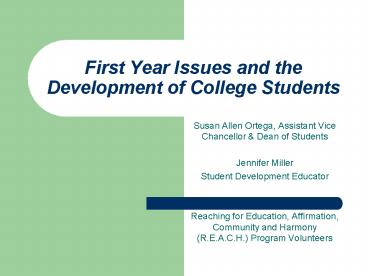First Year Issues and the Development of College Students - PowerPoint PPT Presentation
1 / 15
Title:
First Year Issues and the Development of College Students
Description:
Interpersonal competence: skills in communication, ... Developing Mature Interpersonal Relationships Experiences with relationships contribute significantly to the ... – PowerPoint PPT presentation
Number of Views:194
Avg rating:3.0/5.0
Title: First Year Issues and the Development of College Students
1
First Year Issues and the Development of College
Students
- Susan Allen Ortega, Assistant Vice Chancellor
Dean of Students - Jennifer Miller
- Student Development Educator
- Reaching for Education, Affirmation, Community
and Harmony (R.E.A.C.H.) Program Volunteers
2
Introduction to Chickerings Theory of College
Student Development
- His theory of psychosocial development was the
first major theory to specifically examine the
development of college students. - His work from 1959-65 led to his landmark 1969
theory which provided an overview of
developmental issues faced by college students as
well as environmental conditions that influences
development.
3
Evolution of Chickerings Theory
- During the 1980s Chickering began to further
revisit his original theory and identified areas
for improvement - Incorporate research on gender, race and national
origin. - Acknowledge the greater range of options students
now had. - Consider how the theory should fit adult
learners. - Alter definitions of several vectors to reflect
societal changes and to recognize the work of
other researchers. - Chickering revised his theory to be more
inclusive of various student populations through
his work with Linda Reisser in the 1990s.
4
Why Vectors of Development?
- While some psychosocial theorists like Erikson
viewed identity development as progressing
through a series of sequential stages,
Chickering proposed seven vectors of
development that contribute to identity. - Chickering believed students move through the
vectors at different rates, that vectors can
interact with each other, and students may
revisit vectors previously worked through. - His vectors include emotional, interpersonal,
ethical and intellectual aspects of development.
5
The Seven Vectors
- Developing Competence.
- Managing Emotions.
- Moving Through Autonomy Toward Interdependence.
- Developing Mature Interpersonal Relationships.
- Establishing Identity.
- Developing Purpose.
- Developing Integrity.
6
Seven Vectors Timeline
7
Developing Competence
- Intellectual competence acquisition of knowledge
and skills related to particular subject matter,
development of intellectual, cultural, and
aesthetic sophistication, and skills for critical
thinking and reasoning ability. - Physical and manual skills athletic and
recreational activities, attention to wellness,
and involvement in artistic and manual
activities. - Interpersonal competence skills in
communication, leadership and working effectively
with others.
8
Managing Emotions
- Students develop the ability to recognize and
accept emotions, appropriately express and
control them, and learn to act on feelings in a
responsible manner. - Through his 1990s work he included a more
inclusive range of feelings (anxiety, depression,
anger, shame and guilt) and more positive
emotions (caring, optimism and inspiration).
9
Moving Through Autonomy Toward Interdependence
- Increase in emotional independence freedom from
continual and pressing needs for reassurance,
affection or approval from others. - Increase in instrumental independence
self-direction, problem-solving and mobility. - Students eventually recognize and accept the
importance of interdependence (an awareness of
their interconnectedness with others).
10
Establishing Identity
- This vector was expanded to acknowledge
differences in identity development based on
gender, ethnic background and sexual orientation.
- Includes being comfortable with body and
appearance. - Being comfortable with gender and sexual
orientation. - A sense of ones social and cultural heritage.
- A clear self-concept.
- Comfort with ones roles and lifestyle.
- A secure sense of self through feedback from
others, self-acceptance/self-esteem, and personal
stability/integration.
11
Developing Mature Interpersonal Relationships
- Experiences with relationships contribute
significantly to the development of a sense of
self - Development of intercultural and interpersonal
tolerance and appreciation of differences. - Capacity for healthy and lasting intimate
relationships with partners and close friends. - Reisser contributed that both tasks involve the
ability to accept individuals for who they are,
to respect differences and to appreciate
commonalities.
12
Developing Purpose
- Developing clear vocational goals.
- Meaningful commitment to specific personal
interests and activities. - Establishing strong interpersonal commitments.
- Includes intentionally making and staying with
decisions even in the face of opposition. - Lifestyle and family influences affect the
decision-making and goal-setting processes
involved in developing purpose.
13
Developing Integrity
- Integrity includes three sequential but
overlapping stages - Humanizing values progress from rigid,
moralistic thinking to the development of a more
humanized value system in which the interests of
others are balanced with ones own interests. - Personalizing values value system is established
in which core values are consciously affirmed and
the beliefs of others are acknowledged and
respected. - Developing congruence values and actions then
become congruent and authentic as self-interest
is balanced by a sense of social responsibility.
14
Chickerings Theory and Your First Assignment
Self-assessment and Individualized Plan for
Success
- Provides a framework for thinking about
challenges you have encountered and how to move
forward constructively - Is the foundation for the self assessment
(Student Developmental Task and Lifestyle
Assessment- SDTLA) you will be required to
complete as a first assignment for the course
15
Chickerings Theory and Your First Assignment
Self-assessment and Individualized Plan for
Success
- Specific Actions/ Plans
- Introduce myself to other students in my classes.
- Log on to Student Life website and identify a
club that looks like it might be interesting and
fun. Attend a meeting or event of the club. - Attend the Homecoming Pep Rally, Tail Gate Party
and Game.
- Vision for my change/ Improvement
- Join a club at UCR.
- Get to know more people on campus.
Development Task or Area of Challenge to be
Addressed Get more involved in campus life































